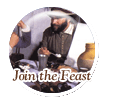Forgive me for going so long between letters. There was so little good to write about after the Great Sickness. More than half of us died, and nearly all the grown women. How childish it was of me to believe this would be a great adventure. Yet God has blessed our family, which is still together. I am finally beginning to feel like this is home. My hands are no longer idle, as there is water to fetch and firewood to gather and meals to cook. Father even taught me how to sew a hat made from beaver pelts. (Apparently the English quite fancy them.)
Mother and Mary and I stayed on the ship through the winter,
doing little but cooking and mending clothes. Once the men had
cut timber, though, we were enlisted to help build our houses.
Father erected a sturdy wooden frame of large oak beams. I filled
the frame with wattle and covered it with daub, which is a mixture
of clay, mud, sand, and dung. (Did you ever think your proper
English niece would be up to her elbows in dung, Aunt Constance?)
By summer we had seven houses, a meeting house, and three small
storehouses — filled with food!
How those storehouses came to be filled was quite unexpected. Last
March a tall Indian walked into our camp, causing much alarm.
But he shouted “Welcome, Englishmen!” — using
the English tongue! He introduced himself as Samoset, and explained
that he had learned a little English from fishermen and traders.
Samoset returned the next day with Squanto, whose English was
as proper as mine. Squanto told us how his people used to live
where we had made our camp, before they were wiped out by a plague.
Perhaps he sympathized with our wretched state, for Squanto taught
us what kind of seeds to plant and showed us how to make fertilizer
from alewives. He also showed us where to fish and how to hunt
wild game.
I fear none of us would have survived without their help. As
it was, not one person chose to return to England when the Mayflower
finally left us in April. To celebrate our first harvest, we rejoiced
together with these Indians and their great king Massasoit. For
three days we played games and feasted. We shall want for nothing
this winter. Two days ago a ship called the Fortune brought new
members to our colony. I am looking forward to making new friends.
Mary already has her eyes on a boy named John. The ship will take
timber and furs back to England, and we have been promised cattle
in return!

